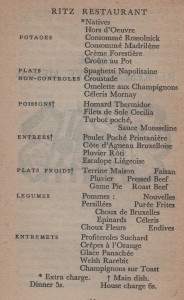 When William Bently Capper, an acknowledged authority on hotel management, and incidentally brother of the famous suffragette Maude Capper, published his booklet Dining Out? in 1948, the War had only finished less than three years before. Rationing was still a problem, particularly for diners out. What was likely to be offered at a good West-end restaurant? Was it worth the expense and effort to eat out there?
When William Bently Capper, an acknowledged authority on hotel management, and incidentally brother of the famous suffragette Maude Capper, published his booklet Dining Out? in 1948, the War had only finished less than three years before. Rationing was still a problem, particularly for diners out. What was likely to be offered at a good West-end restaurant? Was it worth the expense and effort to eat out there?
The whole aim of Dining Out? was to assure gourmets that there was little to fear. Restaurants were not exempt from rationing, but as long as diners recognised that certain rules instituted in 1942 by the Ministry of Food’s supremo, Lord Woolton (promoter of the infamous Woolton Pie), applied to eating places, a pleasant meal with wine could be had almost as easily as in the pre-war era. In his chapter entitled ‘Utility meals for Austerity Times’ Capper outlines what problems gourmets were likely to encounter.
‘Every meal served in a public restaurant, breakfast, luncheon, tea and dinner, is limited and regulated by a four-page document known officially as the Meals in Establishments Order…Public meals are restricted to three courses—but that is not the half of it. Certainly, the restaurateur must not serve you more than three courses, but he is also restricted by law as to what he serves in those three courses. You may not have, for instance, more than one main dish; that is, a dish containing more than 25 per cent of its total weight in meat, poultry or game. You may not have more than two subsidiary dishes: dishes containing less than 25 per cent of the foods specified. If you have a main dish, you may have only one subsidiary dish in addition.
Thus, you may have hors d’oeuvres ( a subsidiary dish), followed by meat or chicken, and then a sweet or cheese. Instead of hors d’oeuvres, you may have white fish ( but not fresh water fish!), or soup or, if you forego the sweet, you may have soup, fish and a main dish. Continue reading
